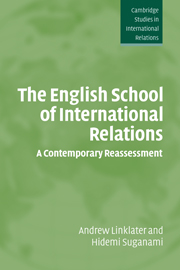Book contents
- Frontmatter
- Contents
- Acknowledgements
- Introduction
- 1 The idea of ‘the English School’ as a historical construct
- 2 The argument of the English School
- 3 The English School on ‘International Relations as an intellectual pursuit’
- 4 Progress and its limits: system, society and community in world politics
- 5 Cosmopolitanism and the harm principle in world politics
- 6 The sociology of states-systems
- 7 The good international citizen and the transformation of international society
- Conclusion
- Bibliography
- Index
- CAMBRIDGE STUDIES IN INTERNATIONAL RELATIONS
3 - The English School on ‘International Relations as an intellectual pursuit’
Published online by Cambridge University Press: 22 September 2009
- Frontmatter
- Contents
- Acknowledgements
- Introduction
- 1 The idea of ‘the English School’ as a historical construct
- 2 The argument of the English School
- 3 The English School on ‘International Relations as an intellectual pursuit’
- 4 Progress and its limits: system, society and community in world politics
- 5 Cosmopolitanism and the harm principle in world politics
- 6 The sociology of states-systems
- 7 The good international citizen and the transformation of international society
- Conclusion
- Bibliography
- Index
- CAMBRIDGE STUDIES IN INTERNATIONAL RELATIONS
Summary
In a brief but perceptive discussion paper, ‘Exporting the English School?’, Martha Finnemore has made a few critical observations about the School's approach to the study of international relations, and offered some friendly advice to followers of this approach about how to make the School products more exportable to the US market. According to her (2001: 509), ‘[g]iving the English School more salience in American IR debates … would be a real improvement’ – for ‘American scholarship would be enriched by incorporation of the historical and normative orientations the English School brings’. There is, in her judgement, ‘an eager audience for the theoretical frameworks that provide traction on such issues’, but hitherto ‘the School's lack of clarity about both method and theoretical claims has made it difficult for American scholars to incorporate it into their research’ (2001: 509). Therefore, ‘addressing these issues might make the English School more useful to more US researchers’ and it ‘might also have the converse effect of sharpening work within the English School’ (2001: 509).
While acknowledging that the orientations of the English School are ‘historical and normative’ and suggesting that the School may perhaps have a valuable ‘theoretical framework’ to offer, Finnemore complains that the School has not explained clearly what its ‘method and theoretical claims’ are. ‘[F]or many American scholars, simply figuring out what its methods are is a challenge’ (2001: 509; emphasis Finnemore's) for ‘English School authors … almost never provide systematic discussions about rules of evidence’ (2001: 509) – so that it is difficult to know, for example, when we can claim that there is an international society, as opposed to merely a system.
- Type
- Chapter
- Information
- The English School of International RelationsA Contemporary Reassessment, pp. 81 - 116Publisher: Cambridge University PressPrint publication year: 2006

